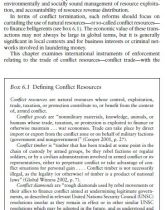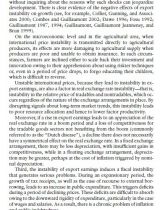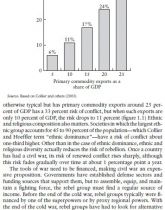Studijní materiál: Natural Resources and Violent Conflict
Skrýt detaily | Oblíbený- Kvalita:82,8 %
- Typ:Studijní materiál
- Univerzita:Masarykova univerzita
- Fakulta:Fakulta sociálních studií
- Kategorie:Humanitní vědy
- Podkategorie:Politologie
- Studijní obor:Bezpečnostní a strategická studia
- Autor:clean.bandit
- Ročník:5. ročník
- Rozsah A4:429 strán
- Zobrazeno:1 103 x
- Stažené:0 x
- Velikost:1,9 MB
- Formát a přípona:PDF dokument (.pdf)
- Jazyk:anglický
- ID projektu:9554
- Poslední úprava:06.02.2017
RECENT RESEARCH UNDERTAKEN BY THE World Bank and others suggests that developing countries face substantially higher risks of violent conflict and poor governance if they are highly dependent on primary commodities. Revenues from the legal or illegal exploitation of natural resources have financed devastating conflicts in a large number of countries across regions. When a conflict erupts, it not only sweeps away decades of painstaking development efforts but also creates costs and consequences—economic, social, political, regional—that live on for decades. The outbreak of violent domestic conflict amounts to a spectacular failure of development—in essence, development in reverse. Even where countries initially manage to avoid violent conflict, large rents from natural resources can weaken state structures and make governments less accountable, often leading to the emergence of secessionist rebellions and all-out civil war.
Natural resources are never the sole source of conflict, and they do not make conflict inevitable. But the presence of abundant primary commodities, especially in low-income countries, exacerbates the risks of conflict and, if conflict does break out, tends to prolong it and makes it harder to resolve.
Reflecting a growing interest in the links between natural resources and conflict and the World Bank’s evolving conflict agenda—which is placing greater emphasis on preventing conflicts—in 2002, the World Bank’s Conflict Prevention and Reconstruction Unit and the Development Research Group began to define a research project to address this link. As the Governance of Natural Resources Project took shape, the discussion moved toward practical approaches and policies that could be adopted by the international community. While there is much that individual developing countries can do to reduce the risk of conflict—by addressing genuine grievances in their societies, adopting economic and social policies that are more inclusive, and improving transparency and accountability—there is also a need to articulate a convincing and practical agenda for global action. As members of the international community working to build a world that is safer and free of poverty, we share a global responsibility in assisting developing countries to ensure that revenues from the exploitation of natural resources do not exacerbate the risk of conflict.
Natural resources are never the sole source of conflict, and they do not make conflict inevitable. But the presence of abundant primary commodities, especially in low-income countries, exacerbates the risks of conflict and, if conflict does break out, tends to prolong it and makes it harder to resolve.
Reflecting a growing interest in the links between natural resources and conflict and the World Bank’s evolving conflict agenda—which is placing greater emphasis on preventing conflicts—in 2002, the World Bank’s Conflict Prevention and Reconstruction Unit and the Development Research Group began to define a research project to address this link. As the Governance of Natural Resources Project took shape, the discussion moved toward practical approaches and policies that could be adopted by the international community. While there is much that individual developing countries can do to reduce the risk of conflict—by addressing genuine grievances in their societies, adopting economic and social policies that are more inclusive, and improving transparency and accountability—there is also a need to articulate a convincing and practical agenda for global action. As members of the international community working to build a world that is safer and free of poverty, we share a global responsibility in assisting developing countries to ensure that revenues from the exploitation of natural resources do not exacerbate the risk of conflict.



